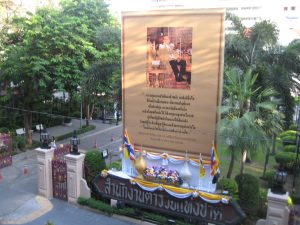Memo #1
By: Paul Evans
 The recent images of the G20 protests in Toronto were disturbing. But they pale in comparison to the scale and implications of the street protests in Bangkok earlier in the summer.
The recent images of the G20 protests in Toronto were disturbing. But they pale in comparison to the scale and implications of the street protests in Bangkok earlier in the summer.
Based on discussions at universities in Bangkok at the beginning of June, the qualities of tolerance and amiable disagreement long characteristic of Thai academic debate are in short supply. Friendships have been broken, lines drawn, hard words exchanged. It is a community torn.
The disagreements centre on a fundamental question: are the protests a leadership struggle or are they manifestations of a social revolution? Is this a conflict between a Bangkok elite and former Prime Minister Thaksin? Or is it a conflict driven by widespread social grievances with implications for the very legitimacy of the Thai state and monarchy?
The moderate middle essential to pluralist democracy is shrinking. Lenin observed that revolutions would be unnecessary if social classes could move along diagonals. At the moment the diagonals in the intellectual class in Bangkok are hard to find.
The role of the King and the future of the monarchy are discussed openly in ways that were unimaginable, and even seditious, a year ago. This extends beyond the vexing matter of succession and into republican calls for a “complete” democracy.
There is consensus on one point. The political struggle and the violence are far from over. Predictions range from increased civil disobedience to low-level insurgency. As this unfolds, the Red Shirts have substantial public support in Bangkok as well as empathizers and supporters, if not leaders, in elite academic institutions.
It remains to be seen whether this is the eye of the storm or the beginning of a whole new weather pattern. Prime Minister Abhisit has presented a roadmap for reform and reconciliation. Whether it will succeed is far from certain when the legitimacy of the political system is being challenged both on the streets and in the faculty commons.
About the Author:
Paul Evans is a professor of Asian and trans-Pacific international relations at UBC, former director of the Institute for Asian Research, and a CEO Emeritus of the Asia Pacific Foundation of Canada
Links
- ‘Unrest in Thailand Indicates Deeper Problems,’ IISS Strategic Comments, Volume 16, May 2010
- ‘The red shirt guard ‘who saved my life,’ Bangkok Post (story about Nelson Rand), June 2010
- ‘Video of Thailand on the Verge,’ ANU’s New Mandala video series, April 2010
Related Memos:
See our other Memos about Thailand and our special collection on Thailand 2011 Election and 2010 Conflict.

